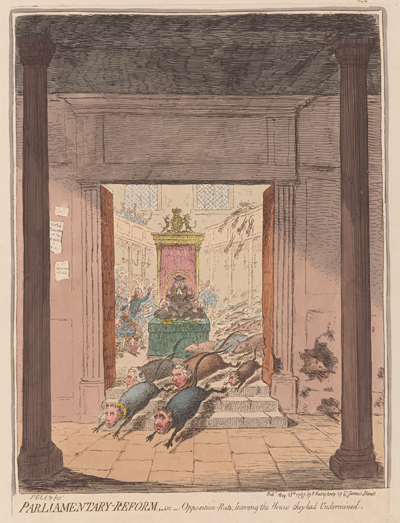Parliamentary-Reform, or Opposition-Rats,
Leaving the House They had Undermined
There are two old and familiar expressions that provide the likely basis for this print. One is of course, the proverb about rats leaving a sinking ship, suggesting that in times of trouble, rats will always seek self-preservation. The other is the metaphor of the "ship of state" that compares the governance of a political entity to the management of a ship. Both are relevant to the historical moment of May 1797 when this print appeared.

Leaving the House They had Undermined [May 28, 1797]
© Beinecke Rare Book and Manuscript Library, Yale University
For many months, Whigs had been complaining (with some justification) about the state of the country). The war against France was not going well. Most of Britain's original Coalition partners against France had abandoned the fight and made their separate peace with the French Directory. The war had been hugely expensive putting such a strain on the treasury that it could no longer back up its notes with real gold. The pride and joy of the Engish way of life, its commitment to personal liberty, had been compromised by the suspension of habeas corpus and the enactment of the Alien and Sedition Acts. And there was a feeling, exacerbated by the publication of Thomas Paine's The Rights of Man and the various revolutionary societies especially in Ireland, that Parliamentary reform was necessary to truly represent the will of the people.
The Whigs attributed this succession of Britain's woes to the mismanagement of Pitt and the Tories, and wished to convince the King and the country that further disasters could only be averted by a change of administration. They argued for an end to what they saw as a pointless and unprofitable war, the repeal of laws which restricted British liberty, and, on May 26, a significant reform in representation in Parliament. The principal speakers in this flurry of initiatives were Charles Grey, Charles James Fox, Thomas Erskine, Richard Brinsley Sheridan, and Michael Angelo Taylor.
All of these initiatives failed—and by substantial margins. These final resounding defeats resulted in a highly questionable decision by a significant number of Foxite Whigs to, in effect, abandon ship, to"secede" from Pariament. As reported in the Evening Mail for May 25-28, here is how Charles Grey framed it:
I certainly shall never wholly abandon my public duty, but when after repeated endeavours to convince Ministers of the danger of their proceedings, and the constant rejection of my propositions, I find it useless to persevere in an impracticable effort. I do not feel it necessary to expose myself to insult and obloquy any longer. Having seen calamity succeed calamity and having done all in my power to avert it, and to bring Ministers to a sense of their impolicy without success, I must despair of effects which I cannot possibly suppose I can produce. Though I shall be here, therefore, Sir, to vote for my Constituents, after this night I do not mean to trouble you or the House with any further opinion.
As he so often does, Gillray finds a way of brilliantly reflecting the prevailing mood of the parties involved. We see all the Whig leaders who spoke in the recent debates transformed into rats with a combination of guilt, despair, and fright on their faces abandoning the House of Commons and leading a flood of other ministry opponents cascading down from the opposition benches and gallery, across the threshold, and out the main doorway, saving themselves from "insult and obloquy." But in stark contrast to the chaos and the every-man-for-himself confusion of the Whig rats as they rush diagonally across the print, Gillray portrays the House of Commons itself straight on, upright, solid, with the Speaker in his chair, framed by classical pillars and marble doorway. The only weaknesses visible in its structure are on the opposition side. Inside Pitt, with raised arm, adresses the chamber as usual. The point, I take it, is to dispute the Whig view of a country reeling from calamity to calamity in danger of dissolution and to assert the fundamental strength of British institutions.
Sources and Reading
- Commentary from the British Museum on Parliamentary-Reform, or Opposition-Rats, Leaving the House They had Undermined.
- "Like Rats Fleeing a Sinking Ship': A History," Merriam Webster
- "Ship of State" Wikipedia
- "Charles Grey, 2nd Earl Grey," Wikipedia
- "Charles James Fox," Wikipedia
- "Thomas Erskine, 1st Baron Erskine," Wikipedia
- "Richard Brinsley Sheridan," Wikipedia
- "Michael Angelo Taylor," Wikipedia
- Thomas Wright and R.H. Evans, Historical and Descriptive Account of the Caricatures of James Gillray #172
- Thomas Wright and Joseph Grego, The Works of James Gillray, the Caricaturist; With the History of His Life and Times p. 222
Comments & Corrections
NOTE: Comments and/or corrections are always appreciated. To make that easier, I have included a form below that you can use. I promise never to share any of the info provided without your express permission.